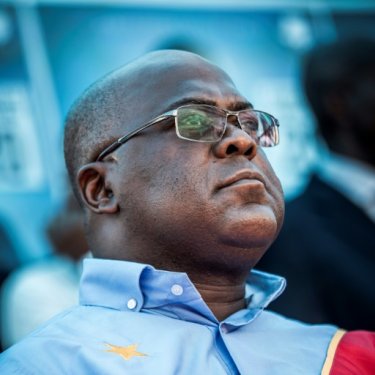“DRC transition won’t be historic if journalists continue to be attacked”

Reporters Without Borders (RSF) and its partner organization, Journalist in Danger (JED), call on the Democratic Republic of Congo’s new president, Félix Tshisekedi, to protect journalists and to end impunity for crimes of violence against the media in what is sub-Saharan Africa’s worst press freedom violator.
In his inaugural address yesterday, President Tshisekedi promised to promote the media and turn them into a “fourth estate.” He also said he would work to ensure respect for fundamental rights and would launch a “campaign to raise awareness among those in positions of authority.”
Such a campaign is needed urgently. Since his election, RSF and JED have already registered two attacks by police against journalists at demonstrations by supporters of rival presidential candidate Martin Fayulu. In the first, police attacked Stanis Bujakera Tshamala, the deputy editor of the Actualite.cdnews website, in Kinshasa on 21 January. In the second, they attacked TV5 Mondecorrespondent Joseph Amaniin Uvira, in eastern Sud-Kivu province, yesterday.
The new president’s inauguration was accompanied by the restoration of Internet services, which had been suspended for 21 days during the elections, the restoration of local broadcasting by Radio France Internationaleand the reopening of three TV channels that had supported the opposition to outgoing President Joseph Kabila: Canal Congo Télévision (CCTV), owned by Jean-Pierre Bemba; Nyota TV, owned by Moïse Katumbi; and Jean-Claude Muyambo’s Jua TV.
“The historic nature of this first peaceful transition from one president to another will depend in large measure on the new president’s policies and, in particular, whether he protects journalists, the guarantors of democracy and the new era he has promised," said Arnaud Froger, the head of RSF’s Africa desk.“As reporters have been among the first victims of police attacks and arbitrary arrests in the DRC, we urge the new authorities to quickly keep the promise to make the security forces aware of the need to respect the rights and freedoms of journalist to do their job to report the news without fear of reprisals.”
JED secretary-general Tshivis Tshivuadi added: “While hailing this pledge by the new president, we believe that, for journalists to be effective as a fourth estate, thorough and urgent media sector reforms are needed both at the institutional level and in the legislation governing how journalists work. In particular, the process of decriminalizing press offences, adopting the law on access to information, and opening up the national radio and TV broadcaster to all currents of opinion must be accelerated.”
RSF saw more abuses against journalists and the media in the DRC in 2018 than in any other country in sub-Saharan Africa. The 110 registered press freedom violations included 53 arbitrary arrests, 31 acts of violence, six media outlets closed or suspended and many days of Internet cuts.
The DRC is ranked 154th out of 180 countries in RSF’s 2018 World Press Freedom Index.



